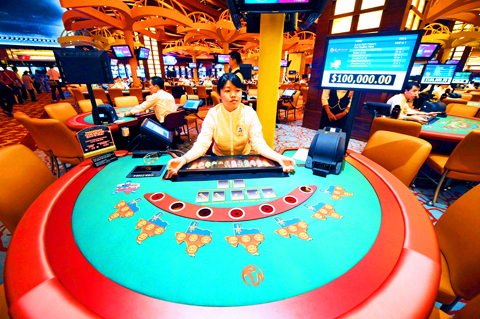Singapore’s first casino opened for business yesterday as the first punter was allowed into the gaming section of Resorts World Sentosa complex.
The opening — to be followed within months by a second casino resort — is part of a multibillion-dollar effort to transform Singapore’s tourism industry.
The doors to the cavernous and carpeted casino were thrown open to the public at 12:18pm on the first day of the Year of the Tiger in the lunar calendar.

PHOTO: AFP
When pronounced in the Cantonese dialect, 12:18 sounds like “prosperity.” A middle-aged Singaporean woman was the first gambler allowed in, followed by an initial crowd of about 200.
The US$4.4 billion resort features Southeast Asia’s first Universal Studios movie theme park, which also opened for a week of sneak previews from yesterday.
“We have waited a long time for this. Today’s opening of the casino is a milestone for Resorts World Sentosa, for Genting Group and for Singapore,” Genting Group chairman Lim Kok Thay (林國泰) said in a ceremony before the doors opened.
“We couldn’t have asked for a better time to open,” he said, referring to Asia leading the world in recovering from the worst global recession since the 1930s.
Singapore’s second casino, Marina Bay Sands, is being completed by the US-based Las Vegas Sands and is expected to open in April.
Officials hope the casinos will help Singapore achieve its target of 17 million visitors a year generating more than US$21 billion by 2015, boosting the services sector and reducing the role of manufacturing in the economy.
A lion dance and firecrackers preceded the opening of the casino.
Resorts World Sentosa last month opened four premium hotels and is testing the rides at the Universal Studios theme park before it is fully opened to the public.
Singapore in 2005 agreed to go ahead with two casino resorts after a rare public debate.
Opponents fear gambling would threaten Singapore’s “family values” reputation and put it at risk of becoming a center for money-laundering.
As a “social safeguard,” Singaporeans will have to pay S$100 a day (US$70) to enter the casinos.

RECYCLE: Taiwan would aid manufacturers in refining rare earths from discarded appliances, which would fit the nation’s circular economy goals, minister Kung said Taiwan would work with the US and Japan on a proposed cooperation initiative in response to Beijing’s newly announced rare earth export curbs, Minister of Economic Affairs Kung Ming-hsin (龔明鑫) said yesterday. China last week announced new restrictions requiring companies to obtain export licenses if their products contain more than 0.1 percent of Chinese-origin rare earths by value. US Secretary of the Treasury Scott Bessent on Wednesday responded by saying that Beijing was “unreliable” in its rare earths exports, adding that the US would “neither be commanded, nor controlled” by China, several media outlets reported. Japanese Minister of Finance Katsunobu Kato yesterday also

Jensen Huang (黃仁勳), founder and CEO of US-based artificial intelligence chip designer Nvidia Corp and Taiwan Semiconductor Manufacturing Co (TSMC, 台積電) on Friday celebrated the first Nvidia Blackwell wafer produced on US soil. Huang visited TSMC’s advanced wafer fab in the US state of Arizona and joined the Taiwanese chipmaker’s executives to witness the efforts to “build the infrastructure that powers the world’s AI factories, right here in America,” Nvidia said in a statement. At the event, Huang joined Y.L. Wang (王英郎), vice president of operations at TSMC, in signing their names on the Blackwell wafer to

‘DRAMATIC AND POSITIVE’: AI growth would be better than it previously forecast and would stay robust even if the Chinese market became inaccessible for customers, it said Taiwan Semiconductor Manufacturing Co (TSMC, 台積電) yesterday raised its full-year revenue growth outlook after posting record profit for last quarter, despite growing market concern about an artificial intelligence (AI) bubble. The company said it expects revenue to expand about 35 percent year-on-year, driven mainly by faster-than-expected demand for leading-edge chips for AI applications. The world’s biggest contract chipmaker in July projected that revenue this year would expand about 30 percent in US dollar terms. The company also slightly hiked its capital expenditure for this year to US$40 billion to US$42 billion, compared with US$38 billion to US$42 billion it set previously. “AI demand actually

RARE EARTHS: The call between the US Treasury Secretary and his Chinese counterpart came as Washington sought to rally G7 partners in response to China’s export controls China and the US on Saturday agreed to conduct another round of trade negotiations in the coming week, as the world’s two biggest economies seek to avoid another damaging tit-for-tat tariff battle. Beijing last week announced sweeping controls on the critical rare earths industry, prompting US President Donald Trump to threaten 100 percent tariffs on imports from China in retaliation. Trump had also threatened to cancel his expected meeting with Chinese President Xi Jinping (習近平) in South Korea later this month on the sidelines of the APEC summit. In the latest indication of efforts to resolve their dispute, Chinese state media reported that